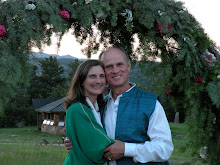-->
Notes on a visit to
the Mondragon worker-owner cooperative system, by David and Lila Tresemer,
September 2012 (www.MountainSeas.com.au and www.DavidandLilaTresemer.com), PART
III
Management at Mondragon has the job of figuring out what the
world marketplace is doing. Fagor, their big factory, makes clothes washing
machines (and other things) in big factories with lots of moving parts and
expensive equipment. Our guide said that, “In ten years, all of these kinds of
things will be made in Africa and Asia. It’s our job to figure out what will be
needed in the future, and begin retooling our factories now.” He said that it
requires a 500,000 Euro investment to create one job in a foundry. That’s 50
million Euros for 100 jobs. It requires a 200,000 Euro investment to create one
service job (without so much expensive equipment). When you look at how an
investment might be made redundant in a short time period, you hesitate to make
that investment!
To repeat, tensions exist in competition with other
manufacturers. The Mondragon
cooperatives are islands of cooperation in a sea of world-wide competition.
The system of governance in the cooperative gives more power
to the individual. Thus there is an expectation
that the individual is educated about the company, and motivated for best
interests of the company rather than solely for their personal welfare.
As a result, during these times they have been known to vote
to take salary cuts of up to 12%, keeping everyone employed, as that is the
highest value.
Brief history of their founding: In the 1930’s the Basque
valleys could not be reached easily as the roads were poor. The Basque language
was unlike Spanish or French. The Spanish government cut them off from many
services. Poverty was rampant. A Catholic priest assigned to them, Jose Maria
Arizmendiarrieta – sometimes called Arizmendi (Ah-rees-MEN-dee) for short –
determined to assist their development. He began with five people who shared
his values, and began a school to train them in technical matters. Soon after
they began constructing clothes washing machines and electrical heaters. It
took years to form other cooperatives, start their own bank, etc. – the long
slow growth curve that begins horizontal and now has gone near vertical.
Arizmendiarrieta means oak (ariz), mountain (mendi), place
of stones (arrieta). He put in years of hard work to organize the people in the
Basque country, beginning in Assarte (Mondragon), Spain. Some quips from him:
“To democratize power, we must socialize knowledge.” Thus shows his emphasis on
education that continues to this day. “The ideas you don’t put into practice
are only reflections.” Thus his emphasis on actions. “Your savings or your
suitcase.” – meaning either put your money into the new bank that they were
starting, or leave town.
Values are generally different: They value the best interest
of the Whole, rather than promote the supremacy of the individual. They take
care of each other, and help find employment for another coop member if his or
her job becomes redundant.
Cooperative of cooperatives (120 of them altogether): Once
in that group, they consider their main task is to keep all employed. They move
people around as market conditions change.
Some details:
·
In Spain you must employ handicapped people for
2.5% of your workforce or give 2.5% of your profits to funds that support the
handicapped. Mondragon has chosen the first, and they are happy at how this has
made their companies more diverse and interesting, and responsive to the
communities in which they live.
·
Unemployment in Spain 40% (or higher).
Unemployment in the cooperatives 0%.
·
Taxes on companies in Basque country: 28.6% of
profit. However, if you are a coop and you have a 10% Education Fund and at
least a 20% Reserve Fund (Mondragon averages 45% for the Reserve Fund) and at
least 80% of your workers are members of the coop, your taxes to Spain are 10%.
·
The bank, Caja Laboral, spends 40.60 Euros to
get 100 Euros in profit, compared to the usual expenditure of 50 Euros. Their
delinquency rate is 5% (vs. other banks 9%). They have 1.2 million clients.
·
They have a rule for change: 25% of their
products should be new every four years.
To become a member, it costs $15000 euros, plus 3-year (or
is it one? – my notes are not clear on this point) trial period of provisional
membership (the worker is paid during this time)—to be sure there is alignment
all around. They currently have 84,000 members in the Basque region and 15,000
throughout other parts of Spain and the world.
Some problems in our view:
·
They don’t address their own food production for
their area. Their businesses are primarily for export, such as clothes washing
machines to go all over the world.
·
The factories are big, metallic and lonely (not
really different from anywhere else).
·
They currently focus on manufacturing as their
business (washing machines, solar panels, …) which puts them at the mercy of
international markets where the rules are quite different, e.g., low wages in
Asia.
In many places in the world, workers don’t want to share in
the risk of the enterprise. Coops aren’t for everyone. But they do provide a
model for cooperation at its best in regards to a community taking care of
their own. The ideal of a group of people pooling their time, energy, money,
and ideas to make something work is terrific. It contrasts with people who say,
“Just give me a job. I don’t care what I do. If I don’t like it, I can drop out
and get welfare.”
Coops aren’t the total answer, but they go a long way
towards improving the situation for workers.
More in the next Part IV.

No comments:
Post a Comment